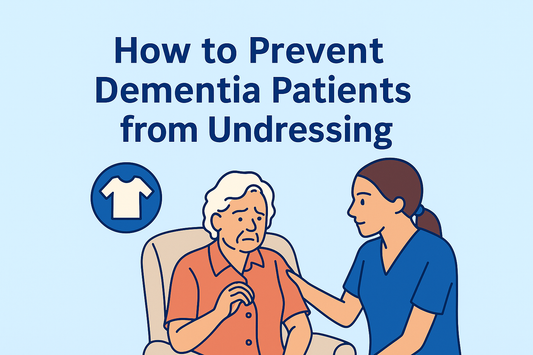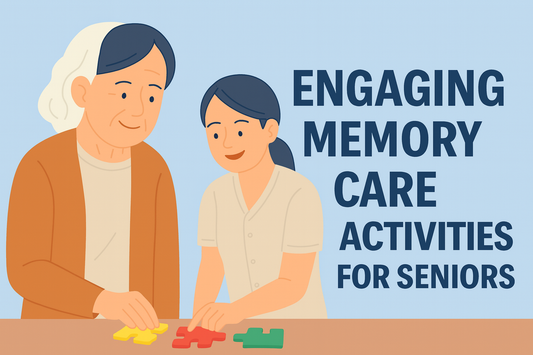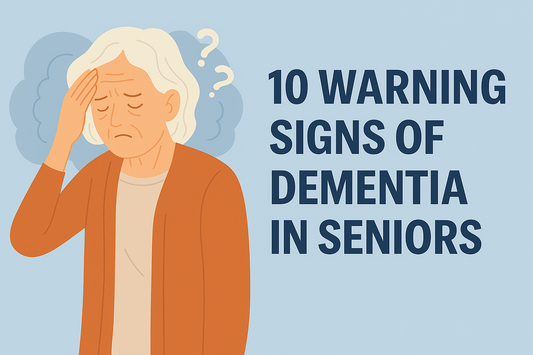
Financial Priorities for Persons with Dementia
FINANCIAL PRIORITIES
The moment you or a loved one is diagnosed with dementia, a normal first reaction is to worry about how it will affect you and your family. Then comes the mental and emotional roller coaster of dealing with the diagnosis. Financial priorities often take a backseat in these situations. However, it should be noted that it is one of the most important items to deal with before the dementia patient’s symptoms progress too far.
Here, you will be able to find information to get you started on the different aspects of financial planning for persons with dementia such as documents to get in order, estimating cost of care, how to cover those costs, and managing the finances of the dementia patient once they are deemed to be of unsound mind.
QUICK LINKS - TOPICS COVERED:
- FINANCIAL PRIORITIES
- HOW TO COMMUNICATE WITH YOUR LOVED ONE ABOUT THEIR FINANCES?
- IMPORTANT FINANCIAL DOCUMENTS TO HAVE IN ORDER
- SESTIMATING COST OF CARE – INCLUDE AVERAGE COSTS
- EXPLORE FINANCIAL RESOURCES TO COVER COST
- MANAGING DEMENTIA PERSONS FINANCES
- WHAT TO DO IF SUSPECT LOVED ONES FINANCES ARE BEING ABUSED?
HOW TO COMMUNICATE WITH YOUR LOVED ONE ABOUT THEIR FINANCES?
Having a loved one who’s beginning to suffer from dementia will be a stressful and tough stage in someone’s life. A number of things and habits have to be adjusted. This includes the person’s healthcare, financial, and legal matters. Therefore, it is important to begin the planning in advance or as soon as the diagnosis is made by a doctor. As a family member of the dementia patient, you should calmly start introducing these topics and plan in collaboration with them. This way, you can ensure that your loved one’s wishes are being honored accordingly.
IMPORTANT FINANCIAL DOCUMENTS TO HAVE IN ORDER
Bank and Brokerage Account Information
Firstly, bank accounts and brokerage accounts are two different things. It is important to avoid getting them confused. A bank account allows someone to store or accumulate savings by earning interests. A brokerage account on the other hand, allows a person to accumulate money by investing it and earning profits on them.
A brokerage account allows buying and selling of everything from stocks and bonds to mutual funds, currency, futures, and options contracts, depending on the broker. Over the long term, the return on a diversified investment portfolio is much greater than a savings account interest rate, which likely will not beat inflation.
In order to better manage the accounts of the dementia patient, you will need to have some documents in order ahead of time. These include bank cards, pin codes, and any related paperwork and statements. It is advised that the primary caregiver be responsible for this as they tend to be the person closest to the patient. It is advisable to keep these documents in a safe place so that the dementia patient does not act impulsively or make any decisions that may jeopardize them or their finances once their illness progresses to a stage where their judgement is impaired.
Deeds, Mortgage Papers or Ownership Statements
Deed: A deed is a written instrument that, when executed and delivered, convey the title to or an interest in real estate.
Mortgage: A mortgage is a pledge of real estate as security for the payment of a debt.
Ownership Statements: Ownership statements are documents that declares that a person owns a part or a totality of some item, property, or asset.
Even if you are familiar with these terms, as a caregiver or the person responsible for your loved one’s finances, you should review them and make sure that they are all in order. In the even that something needs to be reviewed or settled, you should do so accordingly.
Insurance Policies
An insurance policy is a contract between the insurer and the insured that determines the claims which the insurer is legally required to pay. In exchange for an initial payment, known as a premium, which can be paid annually or monthly, the insurer promises to pay for loss caused by perils covered under the policy language.
If the dementia patient’s insurance policies’ tenure extends for some time, the primary caregiver or financial handler should ensure that the premiums are being paid on time and if any claims need to be made, they should follow up with the insurance provider accordingly.
Monthly or Outstanding Bills
The typical monthly bills are the bills we are familiar with. These can include water, electricity, cable, phone bills and so on. There many also be some outstanding bills that don’t necessarily come every month. They could be billed quarterly or annually. In such situations, one should evaluate the need for those product or service and pay or discontinue accordingly.
Pension and Retirement Benefit Summaries
As the name indicates, these are calculated summaries of your loved one pension or retirement benefit.Having these in order will allow you to have a better control on incoming money and also understand what you are dealing with.
Social Security Payment Information
Having your loved one’s social security payment information in order allows you to keep track of what there is to pay and ensure that you and your loved one are not incurring the risk of having something to pay and not having the help you need from the social security.
Stock and Bond Certificates
A stock certificate is the physical piece of paper representing ownership in a company. Stock certificates include information such as the number of shares owned, the date, an identification number, usually a corporate seal, and signatures.
A bond certificate is a document that states the details of the bond including the bond issuer's name, the bond’s par value or face amount, the interest rate, and the maturity date. Bond certificates are in effect a receipt for the bondholder that shows evidence of the bond ownership as well as the terms of the bond.
These are documents that have an important value since they not only give you an idea of your loved ones assets, but also allows you to take them into consideration when planning for the financing of their healthcare arrangements if needed.
Other Sources of Monthly Income
Other sources of income, monthly, annually, or otherwise can include rental income from one or more property, sale of stocks, or interest from investments and similar items. All these sources of income are very important. Your loved one may have one or all of these, but due to their condition, they will soon be incapable of managing them appropriately.
ESTIMATING COST OF CARE – INCLUDE AVERAGE COSTS
Taking care of a dementia patient or even simply paying for their care can place a heavy strain on the caretaker and their family. Below are some estimated costs a few types of care arrangements.
- Adult Day Care Services –$59/day
- In-home Care Services–$20/hour
- Full-time residential care Services – $250/day
You can get more details on the types of care arrangements available for a dementia patient and the respective cost here.
Apart from the estimated costs of the specific care arrangement, we must not forget the highly variable but still accountable costs of doctor’s appointments, medication, clothing, home improvements, and so on. The exact amount for these costs may vary from month to month and over time as the dementia patient’s needs change. Therefore it is important that you plan your finances thoroughly before committing to anything you might regret.
EXPLORE FINANCIAL RESOURCES TO COVER COST
Insurance
Government Programs
Medicare
Medicare is a federal health insurance program. It is designed for people aged 65 or more who are also receiving Social Security retirement benefits. Those who are younger than 65 and have been receiving Social Security disability benefits for at least 24 months may also qualify. Medicare covers inpatient hospital care, doctor's fees—partial or selected item—, medical items, and some prescription drugs. The program also provides some home health care, including skilled nursing care and rehabilitation therapy, under certain conditions but it does not cover for long-term nursing home care.
Medicaid
Medicaid pays for medical care for people younger than 65 if they are disabled and for people with very low income and asset levels. It can also pay for long term care for individuals who have used up most of their own assets.
Long-Term Care Insurance
If long-term care insurance is activated before or by the time of the diagnosis, be sure to be clear on when the policy will mature and the benefits can be claimed. You should also be aware of what the daily value of the benefit is and if it accompanies inflation. Another thing to make note of is the types of care programs that are covered by the insurance and duration of its cover.
COBRA
COBRA refers to the Consolidated Omnibus Budget Reconciliation Act of 1985.COBRA may be an option in order to continue health coverage if the person with dementia is younger than 65 years old and works for an employer with more than 20 employees. Under this program, an employee may continue the group plan coverage even if they leave the employer or has work hours reduced to a point that no longer qualifies for the health plan.
This plan can be helpful until the dementia patient can get a new coverage through an employer or spouse or becomes eligible for Medicare. The program must be activated within 60 days of the dementia patient receiving notice for the insurer that COBRA may be an option.
Disability Insurance
This program provides income for a worker who can no longer work due to illness or injury, but it has to be in place before symptoms of dementia start to appear.
Life Insurance
Some life insurance policies offer accelerated death benefits. This means that some of the insurance benefits may be paid if the insured person is not expected to live beyond the next six to 12 months due to a terminal illness. The payout may run as high as 90% to 95% of the policy's face value and will not be taxed as income.
Retirement Benefits
Retirement benefits are financial instruments designed to help people once they retire and stop working. A person typically receives retirement benefits in the form of regular cash installments or as protection in the form of insurance coverage.
Personal Savings and Assets
As the name indicates, personal saving and assets are the wealth that a person accumulates over time through savings of their salary, investment returns, and other assets. This type of financial resource, usually the patient’s own, may be a reliable source of partially or fully funding the expenses of their dementia treatment.
Community Support
Sometimes, dementia organizations and associations may offer help in order to suppress the heavy costs of the treatments and caregiving. You can approach your local associations for more information on the kinds of assistance they are able to provide. It is best to keep yourself updated on a regular basis in order to benefit from it as much as possible.
Online searches also can provide information on local, state, or national dementia programs that provide some financial assistance. If your loved one’s situation can qualify for assistance, the weight of financing their health care arrangements can be lessened significantly.
Tax Deductions and Credits
Medical Expenses
Medical expenses can take a toll on your budget if it is not considered ahead of time in you loved one’s insurance policies. However, by understanding what is categorized as a medical expense or not, you may have the opportunity to pay less or deduct some expenses.
The IRS allows your loved one to deduct preventative care, treatments, surgeries and dental and vision care as qualifying medical expenses. They can also deduct visits to psychologists and psychiatrists under this category. Some prescription medical aids such as glasses, contact lenses, false teeth, and hearing aids are also tax deductible. In addition, you can also deduct expenses incurred during travel for medical care. This includes fuel costs for your car, bus fare, or parking fees.
Child and Dependent Care Credit
This type of credit applies to people who are paying someone to take care of their loved one or another person in your household while at work. This credit "returns" a portion of the moneyspent on care and can be deducted off the tax bills.
To qualify for the child and dependent care credit, you must have paid someone to care for one or more of the following people:
- A child aged 12 or less at the end of the year, who you can claim as a dependent on your tax return.
- Your spouse, if they are unable to take care of their self and has lived in your home for at least half the year.
- Any other person claimed as a dependent on your return if they cannot take care of their self and has lived in your home for at least half the year.
Flexible Spending Account
A flexible spending account (FSA) is one of a number of tax-advantaged financial accounts that can be set up through the cafeteria plan of an employer. It allows an employee to set aside a portion of their earnings to pay for qualified expenses as established in the cafeteria plan. The most common item in this are medical expenses and dependent care expenses.
Dependent care FSA may be used to pay for adult day care for senior citizen dependents who live with their families. But before that, in these cases, your loved one has to be claimed officially as a dependent. However, these kinds of support are not applicable to long term adult day cares, for example. You should get more information on this in order to be aware of the types of medical expenses and dependent care expenses that qualify from this account.
State Tax Credit
Some states offer special conditions to relieve the strain of a dependent on the caregiver. They may have special tax programs built on the federal tax credit program. Through this, a family may receive additional tax deductions and credits. The name and eligibility of these programs can differ depending on the state.
MANAGING DEMENTIA PERSONS FINANCES
Power of Attorney
A power of attorney is a document that allows a person to name another individual, usually a trusted family member, domestic partner, or friend, to make financial and other specified decisions on their behalf when they are no longer capable of doing so themselves. You can find more information on power of attorneys and other legal documents needed when managing a dementia patient’s assets and finances here.
Joint Accounts and Managing Bank Accounts
Sometimes, taking over your dementia suffering loved one’s assets and finances completely may leave them feeling unneeded and left out. In such situations, creating a joint account or converting your loved one’s individual accounts into a joint account can be a good solution. Your loved one can be at ease with the idea that they still have a sense of control over their assets and finances while you act as their manager.
Especially during the initial stages, when the patient is likely to have a difficult time accepting their diagnosis and refuse assistance, you can keep an eye on their account and finances and detect any irregularities that occurs. With this method, not only can you keep your loved one’s finances in order, but also keep them feeling a sense of control and independence for as long as they are of sound mind. It is a win-win situation for both parties.
Preventing Financial Abuse
Simplifying Investment Portfolio and Financial Accounts
By simplifying your loved one’s investment portfolio and financial accounts, you can make sure that they are not drowned in complex financial matters. This is a very important item to note. At the same time, you should avoid letting your loved one to handle all their financial matters alone. Instead, it is best if you are able to oversee or even manage their financial responsibilities.
Use Credit Monitoring Services and Annual Credit Reports
There are ways to monitor your loved one’s credits and financial status, so you can avoid scams. There may be people who may try to abuse your loved one’s finances, being aware of their condition. You can get free annual credit reports from www.AnnualCreditReport.com
Do Not Call Registry
In order to avoid your loved one from buying compulsively from telemarketers, you should add their contact in the Do Not Call Registry.
Create a Spending Plan
As mentioned in the beginning, a lot of benefit can be gleaned from advance planning. Creating a spending plan with your loved one soon after diagnosis is an excellentway of not only keeping them active, but to also in involvingtheir preferences and opinions in the budget. This way they can rest assured that they have had a hand in the planning process and have an idea of what is to come.
WHAT TO DO IF SUSPECT LOVED ONES FINANCES ARE BEING ABUSED?
Unfortunately, dementia patients are often easy targets for financial abuse. There are some indicators that alert you to any financial abuse that your loved one is being subjected to. As soon as you suspect a problem, you should gather as much information and proof as possible and analyze them. If you are unable to track the abuse but still suspect it, you can opt to seek the help of an expert.
Be especially careful when dealing with hired caregivers. Do not give out sensitive financial or personal information if possible and do through background checks if possible. It is always best to try and stay ahead of any possible threats. If you detect any financial abuse, you can contact any of the following entities:
- Elder Financial Safety Center:The center helps older adults avoid the dangers of financial uncertainty and exploitation. Call 214-525-6130 or 214-823-5700, or email efsc@theseniorsource.org
- The Financial Industry Regulatory Authority: The regulatory body of the securities industry has a toll-free helpline for senior investors. Call 844-574-357.
- The North American Securities Administrators Association: The association’s Senior Investor Resource Center provides tools to help senior investors protect themselves from investment fraud. nasaa.org/1723/senior-investor-resource-center
- The Consumer Financial Protection Bureau: The CFPB offers a wealth of information and resources for seniors. consumerfinance.gov/older-americans



